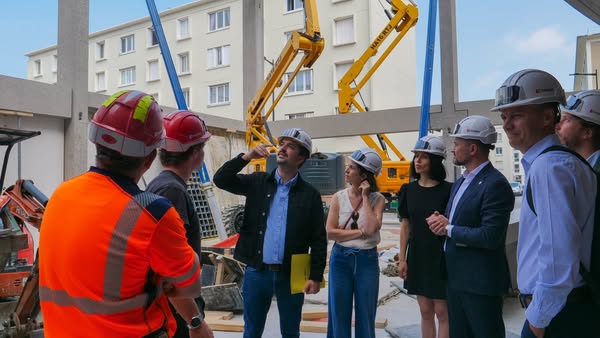At Stand With Ukraine, we continue our commitment to humane, sustainable reconstruction rooted in the real-life experiences of the regions.
As part of our #MistoMatch initiative, which aims to strengthen local cooperation between Ukrainian and French cities, we organized a field mission to Le Havre.
This was the third visit in three years for the Mayor of Mariupol, Vadym Boychenko, to this emblematic city of post-war reconstruction in France.
The objective: to meet with key stakeholders in urban planning, social housing, and local development to identify best practices to share with Ukrainian partners.
On the agenda: an immersion with Logeo Seine, represented by Maxence Gourdault-Montagne and Marie Nguyen Khoa, through two concrete projects:
The LOPOFA in Sainte-Adresse, built in 1958 and completely renovated. Located on an exceptional site overlooking the Bay of Le Havre, this 120-unit housing complex demonstrates an exemplary rehabilitation combining architectural quality, energy efficiency, and the enhancement of social heritage.
The Passage des Cinémas, a new construction on the site of a former cinema, offers an innovative modular response to current needs: social housing coupled with shared workspaces, allowing residents to telework in a local professional environment.
A highlight of the mission was an in-depth discussion with the Le Havre Regional Planning Agency (AURH), represented by Max Yvetot and Thierry Lochard.
We discussed with them the key lessons learned from the reconstruction of Le Havre, current strategies for controlled densification, and issues of sustainable mobility, social diversity, and territorial cohesion.
These insights are valuable for informing reconstruction approaches in Mariupol and other Ukrainian cities.
Le Havre, more than 80% destroyed during the Second World War, remains a powerful example of post-crisis urban planning. While its experience has enabled the rapid housing of millions of people, it has also revealed the risks associated with excessive standardization, spatial segregation, and the breakdown of social ties.
We also presented our ongoing project in Dnipro, where the Mariupol Canteen is part of a reception ecosystem for displaced people, combining vocational training, community catering, and social integration.
With nearly 4 million Ukrainians internally displaced, and more than 5 million living temporarily abroad, it is essential to start thinking about appropriate, accessible, and sustainable housing solutions today.
A huge thank you to our partners in Le Havre for their welcome, their expertise, and their willingness to share their experience with Ukrainian cities on the road to rebirth.

